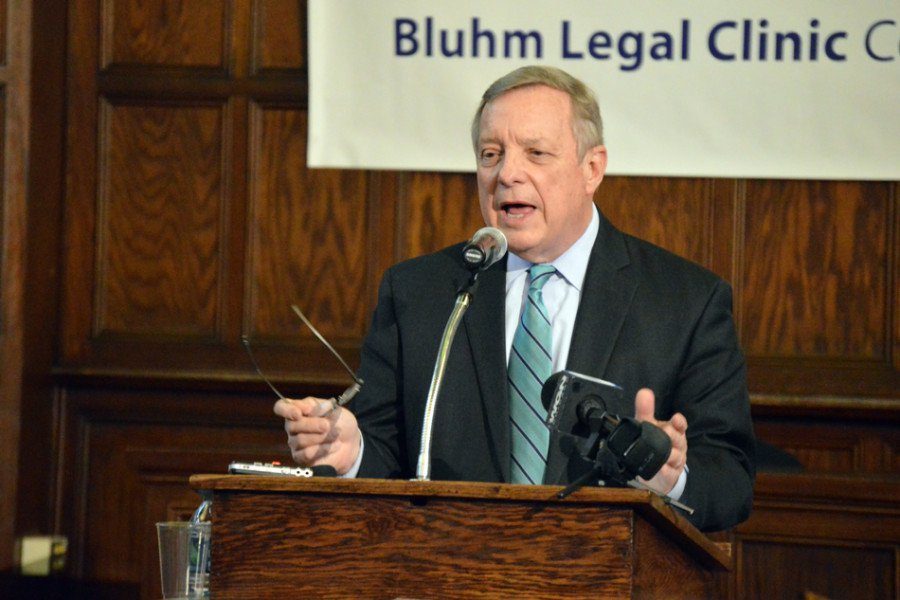Durbin introduces bill to make textbooks free to public
Daily file photo by Paige Leskin
Sen. Dick Durbin (D-Ill.) speaks. Durbin, along with U.S. Sens. Al Franken (D-Minn.) and Angus King (I-Maine), introduced a bill that would make college textbooks free and downloadable.
September 26, 2017
U.S. Sen. Dick Durbin (D-Ill.) reintroduced a bill Tuesday that would make college textbooks free to the public, expanding access to a costly resource for many college students.
The legislation, which U.S. Sens. Al Franken (D-Minn.) and Angus King (I-Maine) also sponsored, will create a grant program to support pilot initiatives that encourage the creation and use of downloadable textbooks.
Students could download the resources for free, then print and bind the books for $30, Kaitlyn Vitez, a higher education advocate for the U.S. Public Interest Research Group, said on a conference call Tuesday. Durbin, Franken and King also joined Vitez on the call to discuss the bill.
“It’s very eye-opening what students do,” Franken said. “I’ve had many students tell me they work 30, 40 hours a week while going to school, and I’ve had kids tell me it’s not unusual they sell their blood to pay the rent. Sometimes they make a choice between buying a textbook and not paying rent.”
The average student budget for textbooks and supplies was $1,250 during the 2016-17 academic year, according to the College Board.
According to a study by the U.S. Public Interest Research Group, 65 percent of students decided not to buy a textbook because of its cost and 94 percent of those students worried that it might hurt their grades. Vitez said the bill would save students $1 billion nationwide and that professors would be able to customize and update the textbooks, eliminating the need to purchase new editions each year.
Durbin said the bill will put pressure on traditional college textbook markets to come up with affordable alternatives. This bill — compared to versions Durbin introduced in 2013 and 2015 — also includes grants toward instructional materials for students with disabilities, Durbin said.
“Textbook costs are one of the most overlooked barriers to college affordability and access and one of the drivers of student debt,” Durbin said.
At the University of Illinois and the University of Minnesota, professors have already published free online textbooks that would have cost students roughly $150 at a bookstore, Durbin and Franken said during the call.
King added that, as a former college professor, half of the materials he used were traditional textbooks while the other half came from websites, essays and blogs. King said he likes the approach of this bill because it avoids “the heavy hand of regulation.”
“We’re not saying what you can and can’t do,” King said. “We’re saying we’re going to create a competitive, low-cost model that hopefully will have the effect of pulling prices down generally and also provide low-cost alternatives.”
Email: [email protected]
Twitter: @sn_handler


